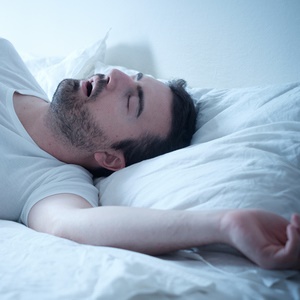
Sleep apnoea is a breathing disorder that occurs during sleep. It is typically accompanied by loud snoring and consists of brief periods during which breathing stops. The brief periods of lack of oxygen can be dangerous as it increases your risk for a heart attack or stroke.
People with more serious cases of sleep apnoea may get lasting relief from an implanted nerve stimulator, a new study finds.
A good alternative
One specialist says the device might benefit those who can't tolerate the current standard treatment for sleep apnoea: continuous positive airway pressure (CPAP). CPAP involves wearing a mask over the nose and/or mouth every night, and many people balk at that.
The new device, called Inspire, works by sending electrical impulses to a nerve that controls the muscles of the tongue. When the stimulator is turned on before a person goes to sleep, it causes the tongue to protrude forward, which helps keep the airways open.
Inspire was approved in the United States in 2014, after a trial showed it was safe and effective over one year.
Durable improvements
The new study followed 65 of those patients to the five-year mark, and found they were mostly still doing well.
On average, researchers found, the patients' ratings of their sleepiness and quality of life had "normalised". And they were still having far fewer apnoea episodes – pauses in breathing during sleep.
"This shows the improvements are durable," said researcher Dr B. Tucker Woodson, an otolaryngologist and sleep specialist at the Medical College of Wisconsin.
Obstructive sleep apnoea is a disorder in which the muscles of the throat fail to keep the airways open during sleep. That results in repeated interruptions in breathing – along with symptoms like loud snoring and daytime grogginess due to poor sleep.
The disorder is common, affecting more than 18 million US adults, according to the National Sleep Foundation.
Fewer episodes per night
Sleep apnoea can be effectively treated with CPAP, but many patients won't try it.
"About one-third of patients look at it and walk away," said Dr Kathleen Yaremchuk, a sleep specialist who was not involved in the study.
Still others try CPAP but do not manage to use it consistently, said Yaremchuk, who is chair of otolaryngology at the Henry Ford Health System in Detroit.
The mask doesn't always fit well, she explained, and there's the inconvenience of having to travel with it and clean it.
So, Yaremchuk said, nerve stimulation offers a potential alternative for at least some patients.
The Inspire device has a few components, according to Minneapolis-based manufacturer Inspire Medical, which funded the current study. The pulse generator, which is implanted in the chest, has two wires. One senses the person's breathing patterns; the other, which runs through the neck, stimulates the hypoglossal nerve when needed. The hypoglossal nerve controls tongue movements.
The device is turned on and off daily via remote control. At the end of the five-year follow-up, Woodson's team found, patients were typically having about seven apnoea episodes an hour each night — down from 29 before the device was implanted. And 89% were no longer snoring, or only "softly" snoring, versus 42% before.
The therapy is not perfect, Woodson said. A couple of patients in the original trial needed to have the device repositioned because of discomfort. Others had temporary numbness of the tongue, while 21% complained of tongue soreness.
Not for obese patients
The approach is only for certain patients, Yaremchuk said, not a "first-line" option.
Officially, the device is approved for people with moderate to severe sleep apnoea who either do not find relief with CPAP or cannot tolerate it. It's also intended for patients with a body mass index of less than 32 – which excludes many obese people.
That's because the device stimulation is not strong enough for larger bodies, Yaremchuk explained.
Patients need a full evaluation to know whether the implant is a good option. And only specialised sleep centers offer it now, Woodson said.
Expensive treatment
Then there's the cost; the device alone is around $20,000 (±R262 000). Because it's a fairly new therapy, insurers are only approving it on a case-by-case basis, according to Inspire Medical.
The estimated battery life of the generator is 11 years, Woodson said, so it will need to be replaced near that time.
Image credit: iStock




 Publications
Publications
 Partners
Partners











